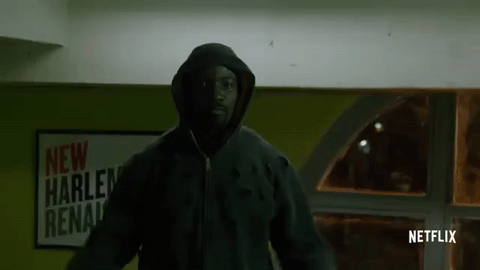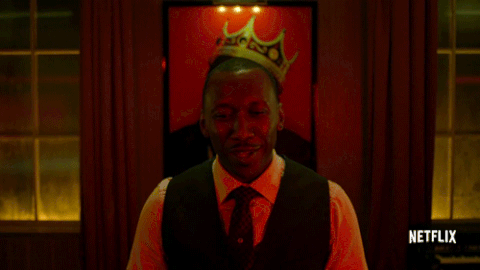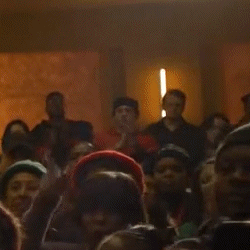Luke Cage is unlike any series I've ever seen. It draws in so many elements from different shows and films. I absolutely love Luke Cage for the characters, setting, and message, but it is also has fundamental issues in its overarching plot and script that cannot be ignored. I'm going in heavy with the spoilers so spoiler alert!
I love how Luke Cage, portrayed by Mike Colter, is painted as the "Everyman" of the Marvel Netflix universe. He's worried about his rent, getting to work, and flirting with ladies. It keeps him grounded and realistic. He's concerned with earning a living and keeping to his morals like most people and it makes him relatable. But Pops (played by Frankie Faison) sees potential in Luke, to use his abilities for a higher purpose. I wish Pops would've stuck around for a few more episodes. I really enjoyed the dynamic between him and Luke, or pretty much any character he shared a scene with. Pops has a history with many of the characters in this show and he represents hope for them all, even Cottonmouth. When Pops is killed that symbol of hope is snuffed out. It sends both Luke and Cottonmouth on a trajectory of conflicting ideologies that leads to an interesting journey for the ladder, and a frustrating journey for the former.
Luke's reluctance to become a hero was a chore to watch him navigate through at times. Hesitance is a part of his character, in fact, "reluctant hero" is a running theme with our Marvel Netflix heroes. The death of Pops seemed like a great way to kick Luke into motion. But after his retaliation and avenging of Pops in the first arc, all we got was a bunch of meandering for the rest of the season due to his over-milked injury due to the Judas bullet. Honesty, it made Luke Cage himself a little boring. It's the characters and realistic charm of Harlem that makes the series interesting, not the titular hero.
Cottonmouth on the other hand is possibly one of the most interesting characters in the show. He's essentially the Kingpin to Luke's Daredevil, and that's not a bad thing. He fulfills the sophisticated gangster role well, but his urban street characterizations set him apart from Kingpin in a way that makes him unique. And his association with the piano is great. The only time he's ever himself and at peace is when he plays. He belongs in the pantheons of great hood villains along with Stringer Bell and Avon Barksdale from the Wire. In fact, he's a perfect melding of the two. He also embodies the viciousness of New Jack City's Nino Brown. Cottonmouth throwing Tone off the building is a perfect example of how they both treat the men working under them. They even share the same love/fear relationship with the citizens of their neighborhood.
Their ideologies cross paths and crescendo during Pops' funeral, with both of them vying to be the new hope of Harlem. At first it felt a bit odd a setting for Cottonmouth and Cage to give a speech symbolizing this. It's as if they're both running for mayor of Harlem. But when you realize they're both in essence trying to fulfill the role of Pop, it all makes sense.
Killing Coppermouth was a mistake. There's much more to explore with his character and family relationship with Mariah. He could have been a wonderful addition to the Marvel Netflix rogues gallery being built up. A welcome addition to this gallery however is Mariah. Her transition from crooked politician to gangster was riveting to watch unfold. Mariah's struggle with the notion of becoming as twisted as Mama Mabel is something I look forward to seeing progress in season 2. I also would like to see more flashbacks of Mama Mabel herself, she's just as sinister as any of the antagonists of the series, and the parallels between her and her granddaughter run deep.
I've always been a fan of Misty Knight, and felt her potential as a character has never been utilized. My sentiments have changed seeing Simone Missick's portrayal of the character; Misty Knight's been done better than I could have possibly hoped for. She's smart, capable, sexy, and has an ability of foresight that could be fun to see played out more in her own series, metal arm included. Her breakout in the series reminds me of Punisher, and hopefully after Defenders her popularity grants her a spin-off just as it did for him.
Claire (played by Rosario Dawson), a character we've seen in every Marvel Netflix show so far, feels most at home on Luke Cage. Her character is grounded enough in this setting than in one where ninjas are a normal thing like Daredevil. I love her arc in this series and her continual growth as a person wanting to help. The "night nurse" shout out from the goon towards the end of the season was a nice touch, as it's the name of the character she's based on in the comics. One problem I have with her is that she's hooked up with almost every guy in the Defenders. Will she make out with Danny Rand as well when Iron Fist premiers? I hope not.
Musical performances in every other episode of the first arc reminded me of New York Undercover. Songs from Raphael Saadiq and Jidenna out instant standouts and stay with you after the show. Both tracks featured are on my iPhone as of now. They're used to transition into montages and set up the atmosphere of what's happening on screen to great effect. Even the original neo-blaxploitation soundtrack is dope.
The show itself has a message, an urge to aware, and tackles issues the black community is facing today. The series hits on blacks and legacies, being wrongly convicted, and young black men versus the police. There are also symbolic undertones throughout the series paying homage to Trayvon Martin, Crispus Attucks, and Biggie Smalls. Usually these moments hit appropriately, and other times, like the Crispus Attucks speech Luke delivers in episode 2, feel a bit transparent and on the nose. I also love the use of the "n-word." It's used to demean, insult, belittle, but also used for great comedic effect. I'm glad to see it not be completely vilified and that the show encompasses all the versatility of the word, as well as all the different emotions it carries.
When the season transitions from Cottonmouth to Diamondback as its central antagonist, the theme of the show switches from heavy street violence to CW super hero freak-of-the-week fodder. Even his costume is goofy. Diamondback is a weak character with weaker motivations. His reveal to be Luke's deranged best friend turned half brother isn't set up well and comes out of nowhere as a result. The resentment he has is with his father, not Luke. Their father actually hates Luke as well. Shouldn't he be ruining his father's life? I understand that their relationship is vital to Luke's origin and is based off the source material, but because this former best friend turned half brother angle isn't hinted at before, it's sudden.
With his addition, the tone of the series goes from serious to campy in an instant, and even falls victim to tropes shows of its ilk (Arrow and the Flash) fall victim to. For example, Diamondback defeats Luke Cage in the streets after a lengthy battle throughout the night, leading into the morning. Diamondback then leaves Cage for dead in the back of a garbage truck and walks off victorious. The next episode he's seeing asking his flunkies if they've found Luke's body. He could have easily finished him off. I understand his want to torture Luke, but Diamondback's logic is silly. Shades even says as much while they're looking for Luke and a wounded Misty in the club. Leading up to his first appearance, he's been built up to be this wise big head of operations, but when he finally shows up, he's more illogical than his lackeys.
The only substantial thing he did for the plot that didn't feel campy or sudden was provided Misty Knight with some splendid character development. And even then, he leaves her alive just like Luke, to further extend his torture. It's silly. The only campy moment that worked for me is the final fight. Which, in classic hood fashion, was a super-powered version of the fight from Friday. It had nearly the same beats in a familiar setting and it was wonderfully meta.
It's as if the season were split up into two with the fate of the series' tone as a whole going forward being based on the reception of each arc. My hope is that going forward, Luke Cage Season 2 feels more like the first half of this one. The campiness of the Diamondback arc felt like a stark contrast from the realistic tone set in this Marvel Netflix universe.
A part of me feels like the show's being held at the standard Daredevil has set, which for all intents and purposes, is a greater show than it necessarily had to be. Which almost makes me wish Jessica Jones and Luke Cage came out first. It would make the errors of both these shows less noticeable as a result, and the fundamental issues of both series' wouldn't be so damnable.


